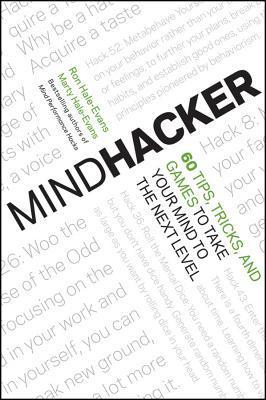What do you think?
Rate this book


Don't you wish you were just a little smarter? Ron and Marty Hale-Evans can help with a vast array of witty, practical techniques that tune your brain to peak performance. Founded in current research, Mindhacker features 60 tips, tricks, and games to develop your mental potential. This accessible compilation helps improve memory, accelerate learning, manage time, spark creativity, hone math and logic skills, communicate better, think more clearly, and keep your mind strong and flexible.
Hacks include: Remember to Remember Build a Memory Dungeon Mix Up Your Facts Space Your Repetitions Recall Long-Ago Events Establish Your Canon Write in Your Books Read at Speed Learn by Teaching Play the Learning Game Pretend You're a Grad StudentStudy Kid Stuff Polyspecialize Integrate Your Interests Sift Your Ideas Ask the Hive Mind Write Magnificent Notes Keep a Mental Datebook Tell Time Who's Boss Meet MET Get Control of Yourself Locate Lost Items Huffman-Code Your Life Knock Off Work Manifest Yourself Woo the Muse of the Odd Seek Bad Examples Turn a Job into a Game Scrumble for Glory Salvage a Vintage Hack Mine the Future Dare to Do No Permanent Damage Make Happy Mistakes Don't Know What You're Doing Ratchet Roll the Mental Dice Abduct Your Conclusions Think Clearly about Simple Errors Notate Personally Notate Wisely Engineer Your Results Enter the Third Dimension Enter the Fourth Dimension Spell It Out Read Lips Emote Precisely Streamline Your Shorthand Communicate Multimodally Mediate Your Environment Acquire a Taste Try Something New Daily Metabehave Yourself Train Your Fluid Intelligence Think, Try, Learn Take the One-Question IQ Test Cultivate Beginner's Mind Take a Semantic Pause Retreat and Reboot Get Used to Losing Trust Your Intelligence (and Everyone Else's)
Visit the Mentat Wiki at www.ludism.org/mentat/Mindhacker for more information on tuning your brain to peak performance.
416 pages, Paperback
First published July 26, 2011